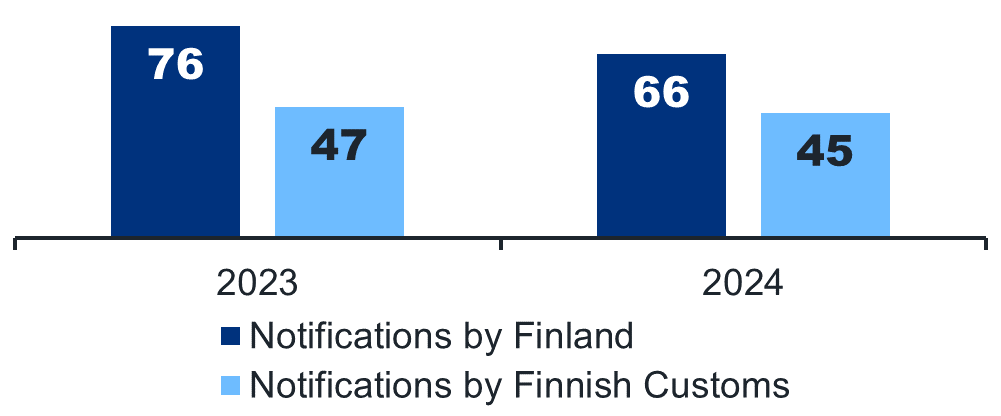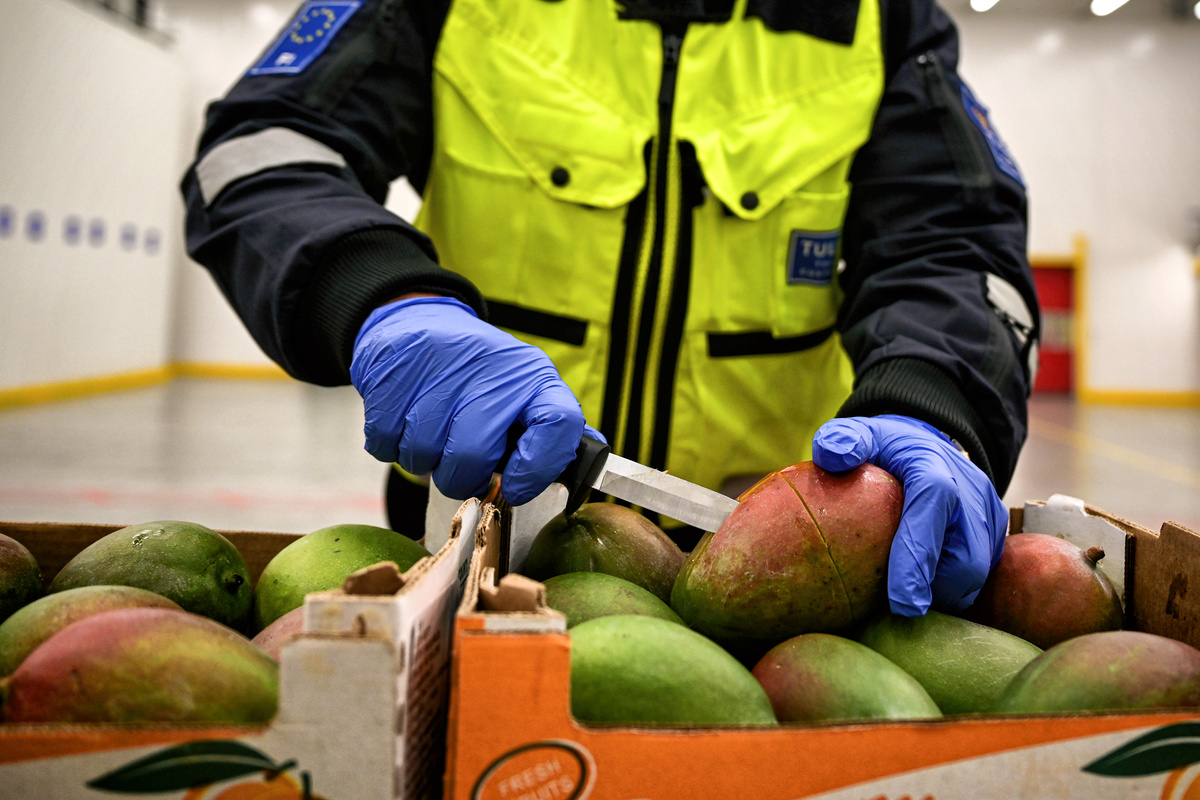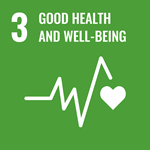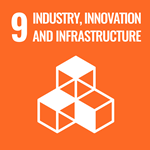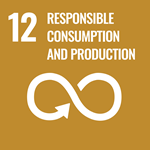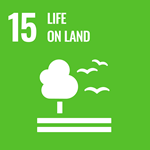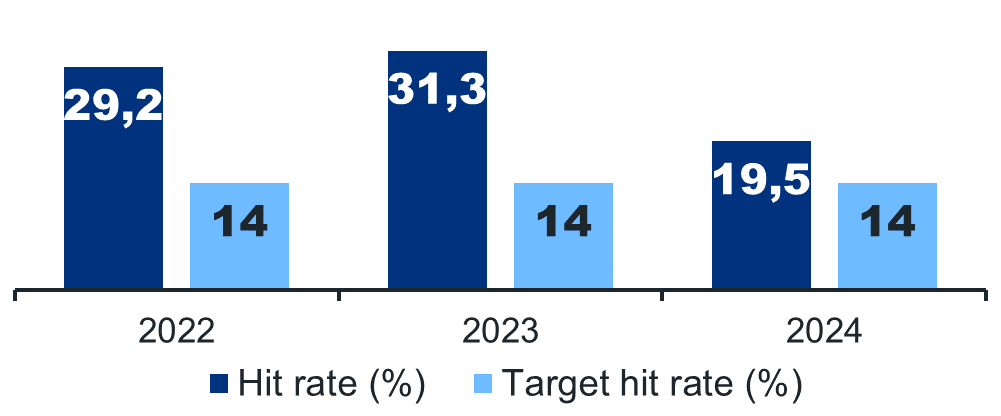We monitor and the movement of goods across the nation’s border and inspect goods. We protect the environment and the health of citizens by seizing from the flow of goods products that are harmful to health and the environment. This way, we combat illicit activity and prevent the spread of plant and animal diseases. We also protect biodiversity, the forestry industry’s operating conditions, the food industry and food production in cooperation with several public authorities.
Finnish Customs has a new role as the national authority in charge of the EU Carbon Border Adjustment Mechanism (CBAM). The CBAM creates an economic incentive system for third-country manufacturers and EU importers to reduce emissions from production processes. As a national authority, we also naturally contribute to sustainable activities as part of our field of operations.
By monitoring hazardous materials, chemical and waste transportation, and the roadworthiness of vehicles, we ensure that hazardous substances, chemicals, and waste do not cause harm to nature and to citizens. Among other things, we stop vehicles that are malfunctioning, overloaded or incorrectly loaded from entering the flow of traffic in Finland.
We monitor product safety by testing the regulatory compliance of products in the Customs Laboratory. With the targeted control of food and consumer goods, we protect the health of consumers first and foremost. Meanwhile, we also prevent food fraud and promote fair competition among companies. Every year, up to one in ten products are found to be non-compliant with product safety regulations. For example, a toy can present a strangulation or choking hazard for a child, and a food product can contain microorganisms or pesticides that are harmful to health.
Our sustainability efforts
What is CBAM?
The Carbon Border Adjustment Mechanism (CBAM) is a new EU tool to prevent carbon emissions from being diverted out of the EU. The CBAM seeks to ensure that the prices of goods imported into the EU better reflect the global warming emissions generated in their production. In the future, goods imported into the EU will be subject to the same payment as goods manufactured within the EU. The payment is based on the amount of emissions.In pr
actice, the CBAM creates an economic incentive system for manufacturers from non-EU countries as well as EU importers to reduce emissions from production processes. The CBAM creates a level playing field for manufacturers in the EU market and supplements the EU Emissions Trading System.
The CBAM is administered both nationally and at the EU level. The Commission develops legislation and cooperates with the competent authorities of the different Member States. The Ministry of Employment and the Economy as the steering ministry and Finnish Customs as the competent authority are also involved in the development work.
Tasks and timetables for CBAM operators
The Carbon Border Adjustment Mechanism (CBAM) is currently undergoing a transition period until the end of 2025. During the transition period, the purpose of reporting by EU importers is to determine the direct and indirect emissions from the manufacture of products manufactured outside the EU (iron, steel, aluminium, cement, fertiliser and chemical products, as well as hydrogen and electricity).
The objective of the CBAM in 2024 was to gather information and report on emissions data from the manufacturing chain of CBAM goods.
The aim of the CBAM is also to help importers identify the emissions associated with the manufacture of the products they purchase. The emission calculation of CBAM goods differs from carbon footprint calculations, because only emissions from the production phase of CBAM goods are included in the calculation.
Start of official activities
Activities by national authorities related to the CBAM started on 1 January 2024. During the year, Finnish Customs has informed customers about the CBAM service, organised training and provided guidance for customers in the use of the EU CBAM transitional registry.
Within Customs, activities as the competent authority for CBAM purposes and as the customs authority are closely linked. The various departments and operational units of Customs work in close cooperation with each other.
Strict international rules govern shipments of waste from one country to another. Finnish Customs is responsible for preventing cross-border environmental crime. On average, Customs has become aware of 10 environmental offences per year. Last year, Customs investigated a total of three environmental offences related to violations of the Waste Act.
International enforcement operation on waste shipments yields results
Finnish Customs and the Finnish Environment Institute (Syke) carried out enhanced control of international waste shipments from October to November 2024 (press release in Finnish) as a part of the global DEMETER enforcement operation. During the operation, the authorities inspected 78 lorry transports leaving Finland by car ferry. Six of the transports had obligations related to waste shipments, and minor deficiencies in documentation were found in all of them. In addition, two exports had to be suspended completely because the necessary documents were missing.
In addition to the waste raid, the enforcement operation also included document checks on waste exported outside the EU from October to November 2024. Of the more than twenty cases, two were suspended on suspicion of illegal shipment of waste. The two cases involved an attempt to export waste outside the EU; one of the shipments that was suspected to be illegal contained cable waste while the other contained used electrical and electronic equipment. In the other cases, the export documents were mostly in order.
Finnish Customs also investigated WEEE exports
In late 2020, the Finnish Environment Institute (Syke) asked Finnish Customs to investigate the contents of six containers reported as being exported to Malaysia. The preliminary investigation revealed that there were grounds to suspect that the activity was more extensive. The company is also suspected of having provided false information to Customs regarding the contents of containers it had previously exported.
The company had used a false commodity code and false additional codes in its exports, according to which the containers were supposed to contain green list waste. The company in question reported Hong Kong intermediaries as the recipients, even though Malaysia was listed as the destination country of the waste. According to the Waste Act, the exporter must always be aware of the final destination of the waste.
When the conditions for waste exports were tightened in 2021 so that only waste classified as green waste could be exported outside the OECD countries, the company changed its operating practices accordingly. The export consignments were now declared to contain scrap iron and commodity codes referring to plastic were no longer used, even though the exports still contained WEEE plastic waste and aluminium and the company still had not applied for an export authorisation for these wastes. By providing false information to the authorities about the contents of the waste containers, the company sought to avoid inspections of the containers.
The company is suspected of exporting nearly 15 million kilograms of waste from electrical and electronic equipment to Asia without the proper authorisations. The company gained more than EUR 1,750,000 in criminal proceeds. Customs has also investigated the company's activities in connection with a 25-tonne consignment of waste returned from Poland to Finland in 2022 as a part of the criminal activities.
The case has been investigated as aggravated degradation of the environment, smuggling and an aggravated customs clearance offence. The preliminary investigation was transferred to the Prosecutor's Office of Western Finland for consideration of charges in 2024.
Finnish Customs has investigated illegal import of whale meat from Norway to Finland. Approximately 36,000 kg of whale meat was imported into Finland as food for sled dogs in 2022. The imported meat was minke whale meat; exporting it from Norway and importing it into the European Union is prohibited.
Whale meat was imported into Finland in dog sausages, which contained half poultry meat and half CITES-listed minke whale meat. A total of 72,000 kg of dog sausages was imported. This type of dog food is not available on the market; it was made to order in Norway for the Finnish importer.
The investigation was launched when Swedish Customs notified Finnish Customs of a shipment bound for Finland and discrepancies in the customs clearance documents. Swedish Customs turned the shipment back to Norway.
The investigation has been conducted in cooperation with the authorities in Sweden and Norway. The Norwegian police have conducted a preliminary investigation into the unauthorised export of whale meat from Norway to Finland. Customs has interviewed a total of five people in connection with the case, which is being investigated as a suspected aggravated nature conservation offence and customs clearance offence. The case has been transferred to the Prosecution District of Northern Finland for consideration of charges in 2024.
The CITES Convention protects endangered species from trade
CITES protects animal and plant species threatened by international trade. Minke whale is one of the species protected under the international CITES Convention. In addition, Finnish national law on the protection of whales and Arctic seals prohibits the import of whale meat and other whale products into Finland from all countries. In addition to the CITES Convention, Norwegian national CITES legislation also prohibits the export of minke whales to Finland for commercial purposes.
There are common rules for plant health inspections within the EU. The aim of the inspections is to prevent the spread of plant pests into the environment. Plant pests can cause significant crop losses in agriculture, forestry and horticulture. Every year, an estimated 20–40% of the world's crop yield is lost due to plant pests, which has a significant impact on food security and people’s livelihoods. Cooperation in Europe is necessary because inspections protect plant production not only in Finland, but also elsewhere in Europe.
In Finland, plant health inspections are carried out by the Finnish Food Authority and Finnish Customs
At Finnish Customs, we are responsible for the plant health inspections of fresh fruit, vegetables and berries when they are imported from outside the EU for commercial purposes. The inspections focus on signs of pests or plant diseases. In addition, all products subject to the inspections must have a valid phytosanitary certificate granted by the country of origin.
The exceptions are bananas, pineapples, dates, durians and coconuts, which do not require a phytosanitary certificate.
We carry out plant health inspections on commercial imports of fruit, vegetables and berries as well as product quality inspections and take samples for laboratory testing for product safety control during the same warehouse visits. In 2024, we inspected approximately 470 import consignments of fruit and vegetables for plant pests.
The Finnish Food Authority is responsible for the control of other plants and plant products. The Finnish Food Authority monitors, among other things, plants and plant products intended for planting as well as timber and seeds.
In addition to commercial imports, the restrictions on imports from outside the EU also apply to imports by travellers and ordering products online. Read more about the restrictions on importing food on our website.
Products placed on the EU market must meet certain legal requirements to protect the safety and health of consumers and the environment. A responsible seller or importer is aware of their responsibilities and ensures the compliance and safety of products for the consumer before they are imported.
Millions of consignments are sent to private individuals from outside the EU every year. This poses major challenges for Customs' product safety control. Finnish Customs controls imports of foodstuffs and consumer goods in intra-EU and external trade based on risks. It checks documents and takes samples for control tests by the Finnish Customs Laboratory. In practice, samples are taken from batches of products in the importer's warehouse after the products have entered the country. The product batch is selected for controls based on a risk assessment.
Customs cannot inspect all consignments, and spot checks would only remove individual non-compliant products from the flow of goods. The tested substance or product is usually worn down or destroyed during testing. Testing is also expensive, so checking individual products is not a sensible use of the authority's resources.
The primary responsibility for the conformity of products lies with manufacturers, importers and sellers. In e-commerce, the importer is a private consumer who orders a product online. If the product does not comply with the regulations, it may not be possible to hold the foreign seller or manufacturer liable.
There are risks associated with the most popular products
The most popular products ordered from online stores were textiles of different kinds. In 2024, one in four items ordered was a textile or textile product (press release in Finnish). Products such as these that come into contact with the skin pose a particularly high risk to the consumer. The risks range from immediate allergic reactions to long-term exposure to carcinogens, among other things. For decades, the EU and other developed countries have tried to reduce these risks by defining in legislation the substances that are allowed or prohibited in products. Increased purchases from Chinese online stores are significantly undermining the work done in the EU to improve product safety.
Product safety risks are also associated with products other than textiles. Read about product safety for tools and sports equipment under "We are exposed to chemicals in everyday items".
Prohibited substances and counterfeit products
In addition to product safety risks, there are restricted and prohibited products sold online, i.e., pharmaceuticals, narcotics and doping agents. Finnish Customs monitors online purchases by private individuals for such products, but the easy availability of pharmaceuticals and doping agents, combined with the explosive growth of other controlled e-commerce shipments, poses challenges for Customs’ enforcement.
The detection of prohibited or restricted products in e-commerce shipments is an everyday job for Finnish Customs. Similarly, counterfeit products are constantly being found. A counterfeit product infringes the copyright or industrial property rights related to the product, and the sale of counterfeit products is punishable under the Criminal Code of Finland.
Read more
Finnish Customs Enforcement 2024: Low-value e-commerce shipments from outside the EU pose various challenges for Finnish Customs
Finnish Customs Sustainability Report 2024: Low-value e-commerce consignments are growing rapidly
People can be exposed to substances that are harmful to health in many different ways. There is a lot of talk about harmful substances entering the body through food and drinking water, but everyday activities that are conducted, for example, during renovation or exercise, can also expose us to a wide range of chemical compounds.
Some of these compounds are known to have far-reaching adverse effects on human health. For example, phthalates used as plasticisers may cause reproductive problems. Lead, which occurs as an impurity in metal, causes symptoms related to the nervous system. Legislation currently imposes extensive restrictions on the amounts of chemicals that may be present in various items and materials.
In 2024, Finnish Customs examined a total of 4,633 food and consumer goods samples, of which 21.5% were rejected or issued a caution. In accordance with Customs’ food and consumer goods control plan, we tested a total of 82 different tools or tool sets and 54 fitness accessories for chemicals harmful to health in 2024. Based on the results, the control is justified, because as much as 15% of tools and 13% of fitness products were found to be in breach of chemical regulations. Lower concentrations of harmful chemicals and errors in package markings were also found in tools, which resulted in a caution to the operator.
The most common defect in the plastic parts of fitness equipment involved phthalates, which led to six different fitness products being denied market access. The plastic material of one dumbbell contained excessive levels of carcinogenic PAH compounds. The most common problems with plastic or rubber parts in tools also involved phthalates and PAH compounds, and for these reasons, 11 tools were denied market access. In addition, the metal in two tools was found to contain too much lead.
Products inspected by Finnish Customs for product safety
Of which cautioned or rejected
Hit rate
Read more
Finnish Customs Sustainability Report 2024: Low-value e-commerce consignments are growing rapidly
Indicators
Hit rate for inspections of vehicles and transport equipment (%)
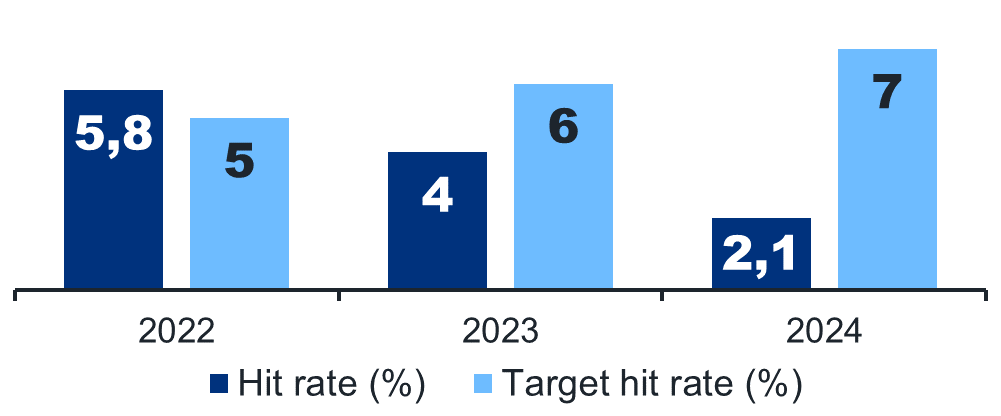
Hit rate for passenger inspections (%)
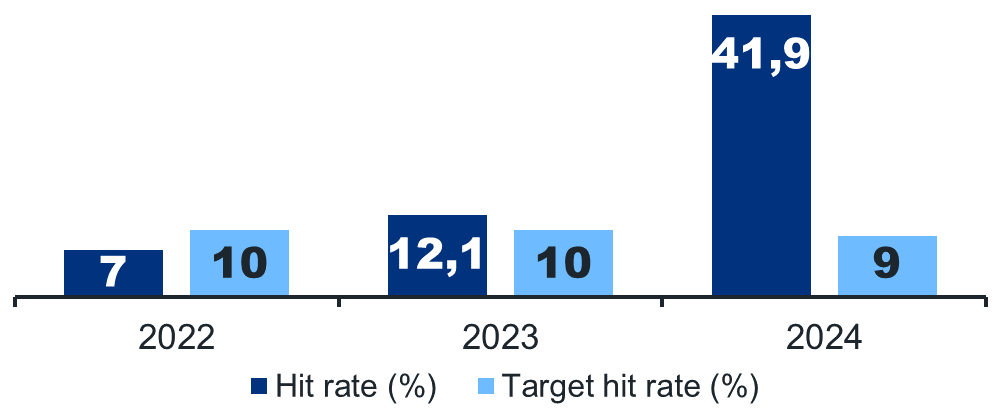
Goods inspections, hit rate (%) and target
Hit rate for food and consumer goods controls (%)
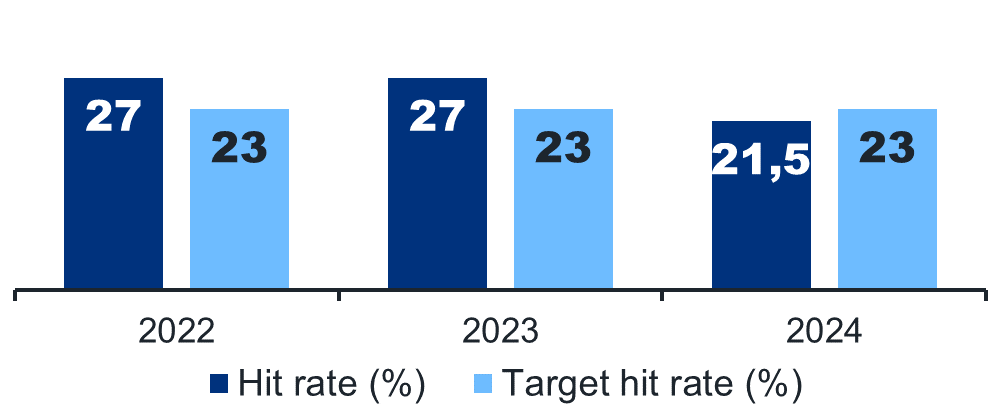
Hit rate for road safety inspections (%)
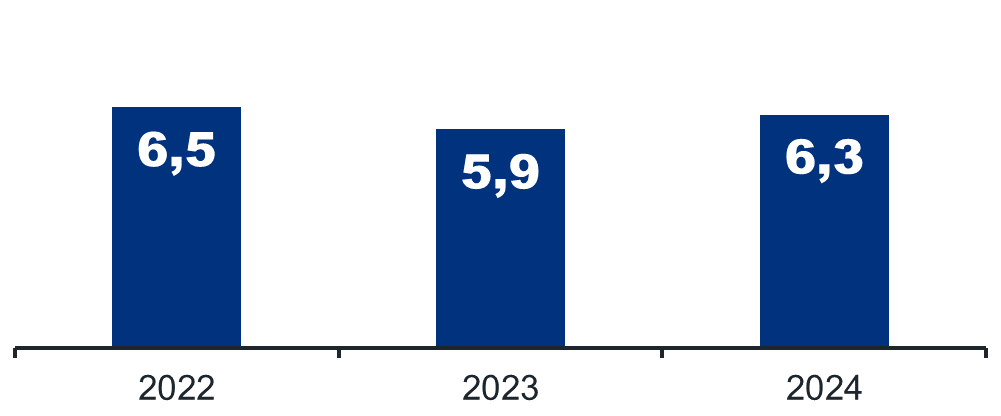
Dangerous consumer goods reported in the EU Safety Gate system in 2024
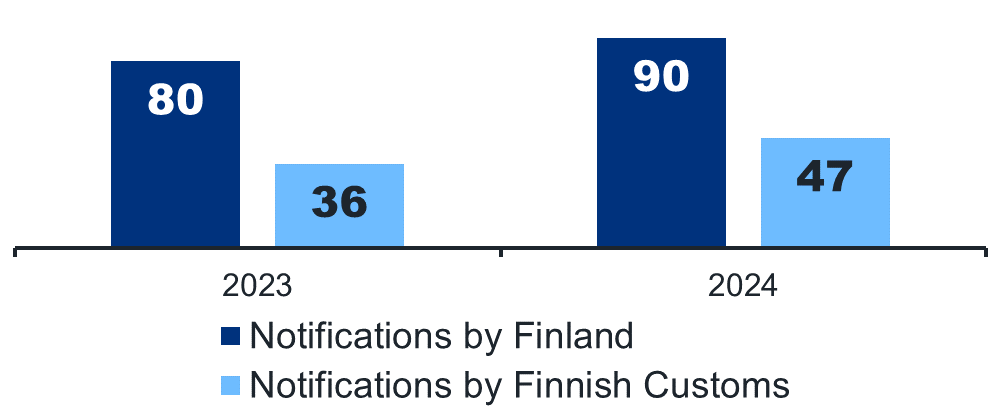
Food and food contact materials posing a severe hazard reported in the RASFF system
